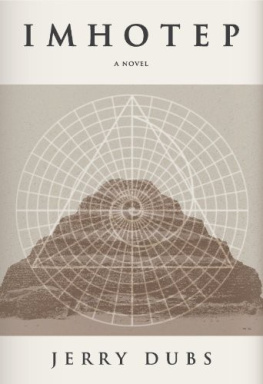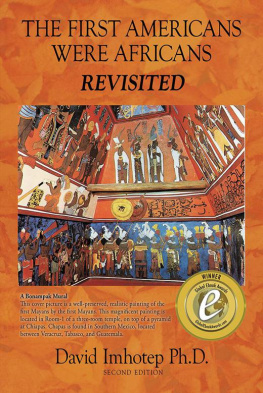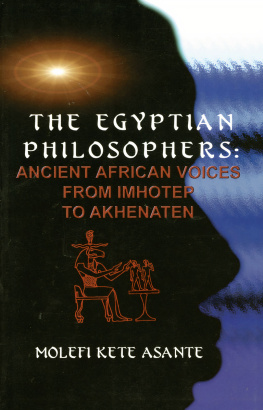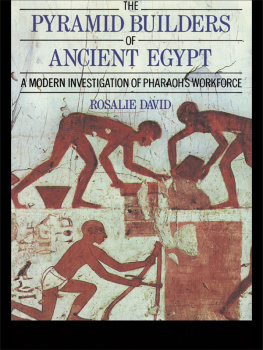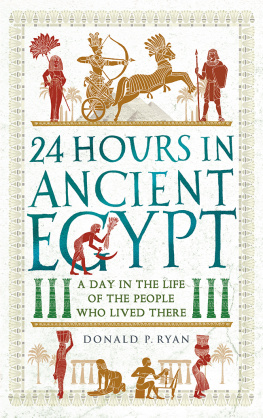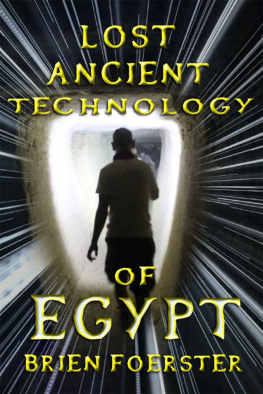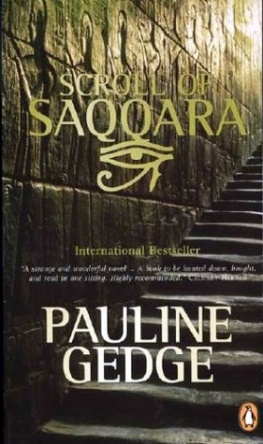IMHOTEP
A novel by Jerry Dubs
IMHOTEP is self-published by Jerry Dubs.
This book is a work of fiction. Although based on historical events and figures, the names, characters, places and incidents described in the novel are the product of the authors imagination or are used fictitiously.
Copyright 2010 by Gerald B. Dubs
All rights reserved.
Copy editing by Karen Merkel
Cover design by Kyle Mohler
Cover photograph by Jerry Dubs.
ISBN 978-0-9846717-2-4
For DebThanks for taking this adventure with me.
CONTENTS
In the Two Lands Prologue Disappearance at Saqqara Into the Tomb of Kanakht Empty Room at the Mena House A Secret Entrance Djefi, First Prophet of Sobek Lost City of Ineb-Hedj Welcoming a god Measuring the Balance of Kemet The Temple of Sobek at To-She Journey to Iunu The Feast of Re in his Barge Tim and Diane Abandoned Gathering at To-She Cutting Out of Sobek's Tongue King Djoser in the Garden of Ma'at The Embalmers of Thoth The Truth finds Brian Prince Teti Imhotep arrives An offering to Khnum Ambush in Tahta On the Road to Waset Ma'at Disturbed At Abu Imhotep and Djoser At the Temple of Sobek The Training of Sobek Thoth Unbalanced The Eye of Re Heralds of the Flood Brian Reborn Djefi at Kom Ombo Gathering at Kom Ombo Preparation The Hunger of Sobek Banishment of Djefi Thoth departs Flight from To-She Siamun in Pursuit Return to Ineb-Hedj At the Tomb of Kanakht Into the Tomb of Ipy Epilogue It's history
Preview KALEIDOSCOPE,
KALEIDOSCOPE Launch
Preview THE EARTH IS MY WITNESS,
the first case of Existential Buddhist detective David Lamb
THE EARTH IS MY WITNESS Saturday, September 5
In the Two Lands
KING DJOSER - Ruler of The Two Lands (also called Kemet) Hesire - King Djosers personal physician Imhotep - Royal architect, adviser and physician Inetkawes - King Djosers wife Kanakht - Vizier to King Djoser and to his father, King Kha-Sekhemmwy Sekhmire - Commander of the palace guard Sati - His wife Siptah - His son Prince Teti - Son of King Djoser, Prince of The Two Lands His personal guards: Bata, Meryptah (brother of Meryt at Iunu), Nesi (brother of Makare at Khmunu), and Rensi
AT IUNU, TEMPLE OF RE
Hetephernebti - Sister of King Djoser, and High Priestess to the sun god Re Meryt - Wbt-priestess in Temple of Re
AT KHMUNU
Makare - Commander of guards at Khmunu, brother of Nesi Nimaasted - Priest of Thoth at Khmunu Tama - Voice of Truth for the goddess Maat Samut - Messenger in service of Tama Waja-Hur - High Priest of Thoth, scribe of the company of gods
AT SAQQARA and INEB-HEDJ
Paneb - Chief artist at the necropolis of Saqqara Ahmes - His adopted son Dedi - His oldest daughter Hapu - His youngest daughter Jarha - A friend of Paneb Takhaaenbbastet - Paneb's wife AT TO-SHE and KOM OMBO, TEMPLES OF SOBEK Djefi - First Prophet of the crocodile god Sobek Bakr - a guard at the Temple of Sobek Dagi - A boatman for High Priest Djefi Karem - A boatman for Djefi Kem - Karem's wife Kiya - Karem's daughter Neswy - Yunets uncle Pahket - Servant girl Sesostris - Priest of Sobek and stepfather to Djefi Siamun - Commander of the guards at the Temple of Sobek Yunet - Chantress at the Temple of Sobek, sister of Djefi, former wife of Siamun AT ABU, TEMPLE OF KHNUM Rudamon - Physician at the Temple of Khnum Sennufer - Priest of Khnum at Abu, father of Sekhmire
Prologue
W aja-Hur, Reckoner of Times and Seasons, was confused.
Holding a charcoal drawing stick in his hand, he stood halfway down the tombs unfinished hallway. He wiped his hand against his white linen kilt leaving behind a black smudge.
His frail body quivered slightly as he stretched himself to examine the hieroglyphics drawn along the top edge of the wall. His own hand had drawn them, he was sure. He was, after all, Scribe of the Company of Gods, high priest for the god Thoth. He had been drawing hieroglyphics all his life. He recognized his work.
But the hieroglyphics were wrong.
Where he had meant to draw the symbol for eternity he had instead drawn the hieroglyphics for a hundred lifetimes.
Waja-Hur shook his head.
A hundred lifetimes was a long time, a very long time. One lifetime was proving to be too long and wearisome for him. There was no one left alive from his youth. His children had grown old and passed on. Their children were growing old now, and still he lingered in The Two Lands, a tired old man ready to make the final journey to Khert-Neter.
He sighed.
A hundred more lifetimes would be enough for him, but the Book of the Dead called for eternity, and Kanakht, vizier to King Djoser, ruler of The Two Lands, deserved nothing less.
The inscription over the false door must invite Kanakht to pass through it to The Fields of Reeds for eternity, not for a hundred lifetimes. As they were drawn now, the symbols created a doorway that would open after the passage of five thousand years.
What had he been thinking?
He picked up a rag to wipe away the incorrect symbols.
Down the long hallway, at the entrance to the tomb, the boy who was holding the reflecting disk sneezed. The polished brass plate the boy was holding jiggled making the sunlight that angled into the tomb swirl.
Waja-Hur gave a small gasp at the illusion of motion. Putting his hand on the wall to steady himself, he dropped the rag. As he bent to pick up the dirty cloth, he felt a wave of dizziness, as if he were spinning like a dancer at one of Re's festivals.
Squatting, he leaned against the wall and waited for the feeling to pass. These moments of unease had started several floods ago. At first he had thought they were harbingers of his own passage to The Fields of Reeds, like ibises flying before the great flood, but they had proven to be merely another annoyance, another burden added to the weight of his long life.
Breathing slowly and deeply, he waited for the world to stop spinning around him. Then he stood, charcoal-smudged cloth in hand, and tried to remember what he had been doing. It had seemed important, but now it was gone.
Shaking his head in frustration, he turned to walk toward light.
Disappearance at Saqqara
T im Hope abandoned his fight against the sand.
It coated his sandals and feet; it had worked its way into his backpack. It was in his hair and in the webs between his fingers. Sitting with his back propped against the remains of a wall that once had formed the southern border of King Djosers funerary complex, Tim was surrounded by Egypt's desert sand.
He put his pencil down and rubbed his hands together, trying to brush away the gritty sand.
A series of shadows crossed over him as a khaki-dressed guide led a ragged line of tourists past him. Their legs moved awkwardly as they took exaggerated high steps to keep sand from trickling into their shoes.
Tim watched them pass and then turned his attention back to the notebook propped against his knees. He added finishing lines to a pencil sketch of his bare feet, crossed at the ankles, sandals dangling loose. In the background of his drawing, desert dunes stretched off to a cloudless western horizon. Off to the east, behind his feet, the rough, pitted blocks of the Step Pyramid rose, angling off the edge of his paper.
In the top left corner of the drawing he wrote, Addy, Theres sand between my toes, under my fingernails and in my hair. I hate it. I hate the way it finds its way into every piece of clothing. I hate how dirty it is. I hate how gritty it feels.
He reread the words he had written to his fiance. He thought about erasing the angry words and replacing them with something more upbeat, but it was hot, he was tired and he missed her terribly. The sand was annoying, but he knew that his anger was really aimed at Addys absence.
Thats Djosers Step Pyramid off to my right. Its less impressive than it should be because theres nothing here to compare it to. I know its huge, but not compared to the sky and the endless desert. And all this... he paused, searching for the right adjective, then gave up and wrote simply sand.
Next page
